- Home
- Bret Easton Ellis
Imperial Bedrooms Page 4
Imperial Bedrooms Read online
Page 4
“Or maybe you should have introduced yourself to the director?” I joke.
She laughs. “The director has a wife.”
“His wife lives in Australia.”
“I heard he doesn’t like girls,” she stage-whispers.
“So I’m that rare thing?” I say.
“What’s that?” she asks, trying to hide a brief moment of confusion.
“The respected screenwriter?” I suggest, half ironic.
“You’re also a producer on this movie.”
“That’s right, I am,” I say. “Which part do you want more?”
“Martina,” Rain says, immediately focused. “I think I’m better for that, right?”
By the time we get to her car I find out that she lives in an apartment on Orange Grove, off of Fountain, and that she has a roommate, which will make everything much easier. The transparency of the deal: she’s good at handling it, and I admire that. Everything she says is an ocean of signals. Listening to her I realize that she’s a lot of girls, but which one is talking to me? Which one will be driving back to the apartment on Orange Grove in the green BMW with the vanity plate that reads PLENTY? Which one would be coming to the bedroom in the Doheny Plaza? We exchange numbers. She puts her sunglasses on.
“So, what do you think my chances are?” she asks.
I say, “I think you’re going to be a lot of fun.”
“How can you tell that I’m going to be a lot of fun?” she asks. “Some people can’t handle me.”
“Why don’t you let me see for myself,” I say.
“How do I know you’re not crazy?” she asks. “How do I know you’re not the craziest dude I’ve ever met?”
“You’ll have to test me out.”
“You have my info,” she says. “I’ll think about it.”
“Rain,” I say. “That’s not your real name.”
“Does it matter?”
“Well, it makes me wonder what else isn’t real.”
“That’s because you’re a writer,” she says. “That’s because you make things up for a living.”
“And?”
“And”—she shrugs—“I’ve noticed that writers tend to worry about things like that.”
“About what?”
She gets into the car. “Things like that.”
Dr. Woolf has an office in a nondescript building on Sawtelle. He’s my age and deals primarily with actors and screenwriters, the three-hundred-dollar sessions partly covered by Writers Guild health insurance. I was referred last summer by an actor whose stalled career hastened a relapse, and this was in July after the breakdown over Meghan Reynolds entered its most intense stage, and during the first session Dr. Woolf stopped me when I started reading aloud the e-mails from Meghan that I saved on my iPhone, and we proceeded into the Reversal of Desire exercise—I want pain, I love pain, pain brings freedom—and one afternoon in August I left midsession in a rage and drove up to Santa Monica Boulevard where I parked in an empty lot and watched a new print of Contempt at the Nuart, slouched in the front row slowly crushing a box of candy, and when I came out of the theater I stared at a digital billboard overlooking the parking lot, its image: an unmade bed, the sheets rumpled, a naked body half lit in a darkened room, white Helvetica lettering curved against the color of flesh.
The nude pics Rain sends me later that afternoon (they come so much sooner than I expected) are either artistic and boring (sepia-toned, shadowy, posed) or sleazy and arousing (on someone’s balcony, legs spread, holding a cell phone in one hand and an unlit cigarette in the other; standing next to a blue-sheeted mattress in an anonymous bedroom, fingers splayed against her lower abdomen), but every one of them is an invitation, every one of them plays on the idea that exposure can ensure fame. At the cocktail party in a suite at the Chateau Marmont—where we needed to sign confidentiality agreements in order to attend—no one says anything nearly as interesting as what Rain’s pictures promise. The pictures offer a tension, an otherness, that’s lacking in the suite overlooking Sunset. It’s the same dialogue (“What’s happening with The Listeners?” “You’ve been in New York the last four months?” “Why are you so thin?”) spoken by the same actors (Pierce, Kim, Alana) and the rooms might as well be empty and my answers to the questions (“Yeah, everyone has been warned about the nudity.” “I’m tired of New York.” “Different trainer, yoga.”) might as well have been made up of distant avian sounds. This is the last party before everyone goes out of town and I’m hearing about the usual spots in Hawaii, Aspen, Palm Springs, various private islands, and the party’s being thrown by a British actor staying at the hotel who had played the villain in a comic-book movie I adapted. “Werewolves of London” keeps blaring, a video of a ceremony at the Kodak Theatre keeps replaying itself on TV screens. A horrible story has moved rapidly through town involving a young Hispanic actress whose body was somehow found in a mass grave across the border, and for some reason this is connected to a drug cartel in Tijuana. Mangled bodies were strewn through the pit. Tongues were cut out. And the story gets more outlandish as it keeps being retold: there’s now a barrel of industrial acid containing liquefied human remains. A body is now dumped in front of an elementary school as a warning, a taunting message. I keep checking Rain’s pics that were sent through earthlink.net from allamericangirlUSA (subject heading: hey crazy, let’s get cracking) when I’m interrupted by a text from a blocked number.
I’m watching you.
I text back: Is this the same person?
I’m staring at a wall, at one of Cindy Sherman’s untitled film stills, when I feel the phone vibrate in my hand and the question is answered.
No, this is someone different.
A group of guys booked a table at a new lounge on La Cienega and I allow myself to be invited as I’m waiting for a cab and they’re waiting for their cars in front of Bar Marmont and I’m staring up at the parapets of the Chateau and thinking about the year I lived there, after I left the El Royale and before I moved into the Doheny Plaza—the AA meetings on Robertson and Melrose, the twenty-dollar margaritas from room service, the teenager I fucked on the couch in #44—when I see Rip Millar pull up in a convertible Porsche. I hide back in the shadows as Rip shambles toward the hotel clutching a girl in a baby-doll dress by the wrist, and one of the guys calls out something to him and Rip turns his head and makes a sound that passes for laughter and then says in a singsong voice, “Enjoy yourselves.” I started with champagne tonight so the lucidity hasn’t worn off and the dead zone isn’t bleeding forward yet and I’m in someone’s Aston Martin and he’s bragging about a whore he keeps in his Abbot Kinney condo just east of the Venice canals and another one in a suite at the Huntley. I murmur the hotel’s ad line (“Sea and be seen”) as we’re passing the limousines and gangs of paparazzi outside of Koi and STK, and standing at the curb in front of Reveal I’m staring at the cypress trees looming against the night sky until the two other guys from the party at the Chateau pull up to the valet and I don’t really know anyone so everything is comfortable—Wayne’s a producer with a deal at Lionsgate that’s going nowhere and Kit is an entertainment lawyer at a firm in Beverly Hills. Banks, who drove me, is a creator of reality shows. When I ask Banks why he chose this place, Reveal, he says, “Rip Millar recommended it to me. Rip got us in.”
Inside, the place is packed, vaguely Peruvian, voices bouncing off the high ceiling, the amplified sounds of a waterfall splashing somewhere compete with the Beck song booming throughout the lounge. As the owner leads us to our table, two paper-thin girls stop me at the entrance to the dining room and remind me about a night at the Mercer in New York last October. I didn’t sleep with either one of them—we were just doing coke and watching The Hills—but the guys become enticed. Someone mentions Meghan Reynolds and I tense up.
“It’s interesting how much play you get out of this,” Kit says, once we’re seated at a table in the center of the room. “Isn’t it exhausting?”
“That’s a questio
n that contains a lot of other questions,” I say.
“Have you ever heard the joke about the Polish actress?” Banks asks. “She came to Hollywood and fucked the writer.” He pauses, glances at me. “I guess it’s not so funny.”
“Be in my screenplay and I’ll make you a star,” Kit says in a baby voice.
“Clay obviously doesn’t underestimate the desperation factor in this town,” Wayne says.
“In a place where there’s so much bitterness,” Banks says with a light touch, “anything is possible, right?”
“Possible? Hey, I just think it’s kind of unbelievable.” Kit shrugs.
“I think Clay is very pragmatic,” Banks says. “What’s unbelievable is clinging to a fading belief in love, Kit.” He pauses. “But that’s just me.”
“I mean, you’re a nice-looking guy for your age,” Kit says to me, “but you don’t really have the clout.”
Banks considers this. “I guess people find this out sooner or later, right?”
“Yeah, but they’re always replaced, Banks,” Wayne says. “On a daily basis there’s a whole new army of the retarded eager to be defiled.”
“You guys don’t need to remind me that I’m not really a player … but I can be useful, I guess.” I’m sighing, staying loose. “Just always make sure you have some kind of producer credit. Stay friendly with the director. Get to know casting agents. It all helps the cause.” I pause for effect before adding, “I’m very patient.”
“It’s a plan,” Kit says. “It’s very, um, subtle.”
“It’s a philosophy,” someone else says.
“It’s just how I roll.”
Wayne looks up, taking note of my uninflected voice.
“I guess it kind of makes sense. You’ve been involved in some high-profile hits,” Wayne mutters, “for what it’s worth.”
Kit leans forward. “It’s just not a very good way to make friends.”
Banks closes his menu when the owner leans down and whispers something to him. Josh Hartnett, who was going to play one of the sons in The Listeners and then bailed, walks over and crouches by the bamboo chair and we have a brief exchange about another script of mine that he’s been circling, but his apologetic lack of commitment only makes me seem more remote than I’m actually feeling. Though I know that what he’s saying isn’t true I smile and agree anyway. Austere plates of raw fish start arriving, along with ice-cold bottles of premium sake, and then the guys make fun of a very successful shark movie I wrote, and the series about witches I created that ran for two seasons on Showtime, then Wayne starts telling a story about an actress who stalked him until he cast her in a movie about a monster that looked like a talking beanbag. Just as the owner sends the table a complimentary dessert—an elaborate plate of sugared doughnuts drizzled with caramel—the night begins sliding into its last act. I’m scanning the room when I see the cascade of blond hair, the wide-open pale blue eyes, the dumb smile that offsets her beauty while at the same time making it more pronounced: she’s on the phone at the hostess stand. And then I realize it’s time to cross the line.
I knew you were here,” Rain says.
“Why didn’t you say something?” I ask, sobering up immediately in her presence. “You could have sent over a few cocktails.”
“I assumed you guys were already wasted when you came in.”
“Why didn’t you say hello?”
“I was seating a table,” she says. “Plus the owner likes to impress Banks.”
“So, this is where you work?”
“Yes,” she purrs. “Glamorous, isn’t it?”
“You seem happy.”
“I am,” she says. “I’m almost afraid of how happy I am.”
“Come on, don’t be afraid.”
She mimics a little girl. “Well, I could always be happier.”
“Well,” I say contemplatively. “I got your pics.”
When I get back to the Doheny Plaza, waiting for Rain to come over after she finishes her shift, I sit in my office checking Rain’s IMDb page again, studying it for clues. There are no credits for the last two years, stopping abruptly after “Christine” in a Michael Bay movie and “Stacy’s Friend” in an episode of CSI: Miami and then I’m filling in the missing pieces, the things she doesn’t want anyone to know. The credits begin when Rain must have been eighteen. I’m doing the math by guessing—the date of birth has been shaved by at least a couple years and I’m putting her age at probably twenty-two or twenty-three. She was at the University of Michigan (cheerleader for the Wolverines, “studying medicine”) but no dates are given (if she attended at all) so it’s hard to confirm exactly how old she is. Though Rain would say it doesn’t matter. Rain would argue that just the idea of her in a cheerleader’s uniform is enough. But the fact that there are no photos of her as a cheerleader causes more whispers in that darkly lit hallway, and the addition of “studying medicine” makes the whispering even louder.
The most recent information: Rain posted a month ago that she was listed as one of L.A. Confidential’s most eligible singles in the December issue, and so is—I notice unsurprisingly enough when I pull up the magazine online—Amanda Flew, the actress I hit on at JFK and who texted me during Rain’s audition. The photo of Rain in L.A. Confidential is the same headshot that obviously is Rain’s preferred image of herself: staring blankly at the camera so that her perfect features can speak for themselves, but there’s the beginning of a slight grin she almost manages to make suggestive of an intelligence that the cleavage and her career choice otherwise argue against. And it doesn’t matter if any intelligence actually exists because it’s really about the look, the idea of a girl like this, the promise of sex. It’s all about the lure. The MySpace page reveals nothing to me at first except that her favorite band is the Fray. “How to Save a Life” plays when you open the page. I’m about to scan it when I get a text from a blocked number.
I look down at the phone on my desk.
The screen says: I’m watching you.
Instead of ignoring it and turning away, I text back: Where am I?
Within the time it takes another text to arrive I’ve already walked to the kitchen and poured myself a glass of vodka. When I reach for the phone back in my office I freeze.
You’re at home.
I hold the phone away from my face and glance out the window.
And then I text back: No I’m not.
It takes a minute before the phone flashes a glow that tells me I have a response.
I can see you, the text reads. U r standing in your office.
I glance out the window again and am surprised when I find myself backing into a wall. The condo suddenly seems so empty but it isn’t—there are voices in it, and they linger like they always do—and I turn off the lights and slowly move to the balcony, and beneath the wavering fronds of a palm tree, the blue Jeep is parked on the corner of Elevado, and then I turn the lights back on and move to the front door and open it and stare down the empty Art Deco hallway, and then I’m walking toward the elevators.
I pass the night doorman and push the lobby doors open and then I’m walking quickly past the security guard and then I stumble into a jog toward Elevado and just as I turn the corner the Jeep’s headlights flash their high beams, immediately blinding me. The Jeep peels away from the curb and it causes a van coming up Doheny to swerve as the Jeep makes a right and lurches toward Sunset and when I look up I’m standing exactly where the Jeep was parked and can see the lights of my condo through the branches of the trees, and except for the occasional car cruising by, it’s dark and soundless on Elevado. I keep my eyes on the windows of my empty office as I walk back to the Doheny Plaza fifteen stories up, a place I was standing in just moments ago, being watched by whoever was in the blue Jeep, and I realize I’m panting as I walk past the security guard, and I slow down, trying to catch my breath, and smile at him, but as I’m about to head inside a green BMW pulls up.
I love the view,” Rain says, holding a tumb
ler of tequila, standing on the balcony overlooking the city. I’m staring past her down at the empty space on Elevado where the Jeep was parked and it’s three in the morning and I come up behind her and down below the wind gently drapes palm fronds over the rippling water of the Doheny Plaza’s lit pool and the only light in the condo comes from the Christmas tree in the corner and Counting Crows’ “A Long December” plays softly in the background.
“Don’t you have a boyfriend?” I ask. “Someone … more age-appropriate than me?”
“Guys my age are idiots,” she says, turning around. “Guys my age are awful.”
“I have news for you,” I say, leaning into her. “So are guys my age.”
“But you look good for your age,” she says, stroking my face. “You look ten years younger,” she says. “You’ve had work done, right?” Her fingers keep combing the hair that had been dyed the week before. Her other hand runs along the sleeve of the T-shirt with the skateboard logo on it. In the bedroom she lets me go down on her and after I make her come she lets me slide in.
During the last week of December if we aren’t in bed we’re at the movies or watching screeners and Rain simply nods when I tell her everything that’s wrong with the movie we’ve just seen and she doesn’t argue back. “I liked it,” she will say, putting a light touch on everything, her upper lip always provocatively lifted, her eyes always drained of intent, programmed not to be challenging or negative. This is someone trying to stay young because she knows that what matters most to you is the youthful surface. This is supposed to be part of the appeal: keep everything young and soft, keep everything on the surface, even with the knowledge that the surface fades and can’t be held together forever—take advantage before the expiration date appears in the nearing distance. The surface Rain presents is really all she’s about, and since so many girls look like Rain another part of the appeal is watching her try to figure out why I’ve become so interested in her and not someone else.

 Imperial Bedrooms
Imperial Bedrooms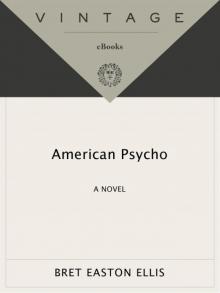 American Psycho
American Psycho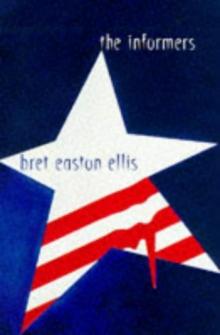 The Informers
The Informers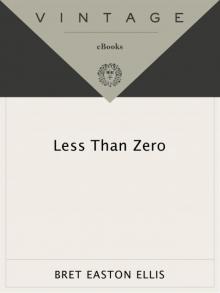 Less Than Zero
Less Than Zero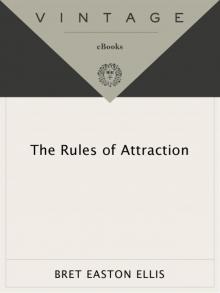 The Rules of Attraction
The Rules of Attraction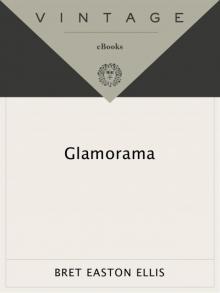 Glamorama
Glamorama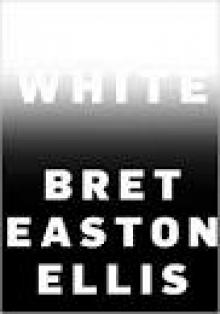 White
White